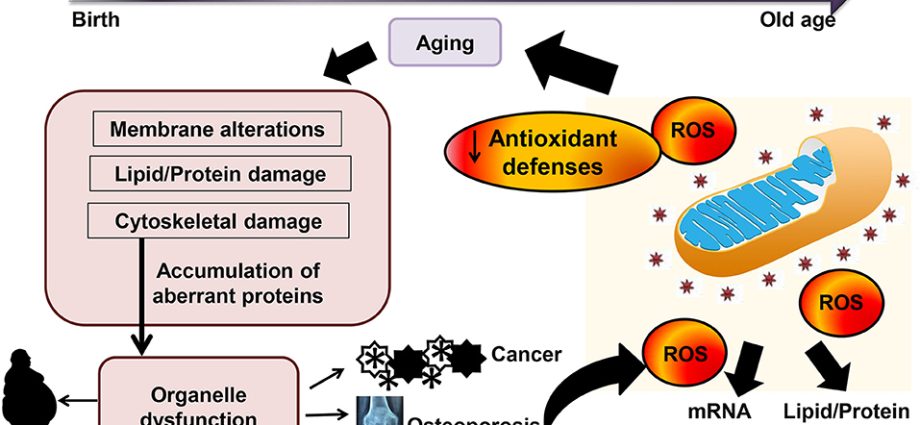Contents
A very frequently heard term is antioxidation. You often hear about antioxidants in cosmetics advertisements, but also in the context of diet or even cancer. However, few people realize what antioxidation actually is and what negative processes in the body it is supposed to prevent. We explain the basics of antioxidant activity and provide tips on how to deliver them to the body.
About oxidation and free radicals
Why are we breathing? This question is only seemingly trivial. In fact, hardly anyone is aware of the essence of this process. Meanwhile, it is the supply of oxygen to the body, which makes it possible to carry out countless metabolic processes in the cells of our body. That is why we feel sleepy when we are in a stuffy room – the less oxygen, the slower our body works.
Unfortunately, every metabolic process is also associated with by-products. These include the so-called free radicals, i.e. active oxygen molecules. In contact with cellular metabolites, they lead to their oxidation, i.e. oxidation, which is associated with tissue damage. While not a strict analogy, some idea of the nature of oxidation may come from the fact that metal rusting is also nothing but oxidation.
Of course, the body also automatically produces compounds that neutralize free radicals. However, there are many factors that disturb the natural balance of oxidants and antioxidants in the body, whether by increasing the amount of the former (including air pollution, smoking, alcohol) or by reducing the secretion of the latter. The main factor that slows down the production of natural antioxidants in the body is age. Unfortunately, this process cannot be reversed. The only way is to provide the body with additional antioxidants.
Why is antioxidation so important?
Oxidation processes have different effects on different parts of the body. For example, antioxidation of the skin is primarily a question of its youthful appearance – free radicals damage the skin’s DNA, and as a result, its reconstruction is impaired. In addition, the oxidation of collagen fibers in the skin causes the skin to lose its firmness and elasticity and to create wrinkles. This is how the skin aging process intensifies.
However, antioxidation is not just a matter of youthful appearance. Free radicals have a detrimental effect on the condition of the circulatory system. They not only worsen the condition of blood vessels, but also oxidize low-density lipoproteins responsible for the transport of cholesterol. As a result, cholesterol is deposited more easily in the arterial wall, which is known to be synonymous with atherosclerotic changes and the development of ischemic heart disease.
Moreover, some researchers have argued that free radical damage to DNA chains may promote neoplastic changes.
How can antioxidants be delivered to the body?
Before we start delivering antioxidant ingredients to the body, perhaps first of all it is worth considering the elimination of ingredients that favor the formation of free radicals from everyday life. We have no direct influence on all of them, but some depend directly on our daily choices. The most common causes of the formation of free radicals include:
- Sunlight. That is why it is worth taking care of wearing sunscreen and limiting sunbathing in the summer.
- A lot of free radicals in the body are formed as a result of contact with cigarette smoke. It is therefore another argument for giving up this addiction.
- The most free radicals are produced by highly processed foods such as frozen foods, salty snacks or fast food, as well as all kinds of dishes fried in oil.
If we want to deliver antioxidants to our body, we can do it in several ways. People who care about good skin condition should be interested in cosmetics with antioxidant ingredients. The ones with the most effective antioxidant properties include:
- vitamins C, A, E,
- carotenes – both alpha and beta carotene,
- known for its antioxidant activity is coenzyme Q10,
- flavonoids,
- grape seed extract.
The list of the most important antioxidant ingredients in food is similar. Our menu includes, among others:
- Citrus fruits, which are a rich source of not only vitamin C, but also flavonoids.
- Berries of all kinds, especially chokeberry, blueberry and blackberries contain a large amount of antioxidant ingredients.
- Various vegetables will provide us with carotenes, including carrots, sweet potatoes, broccoli, spinach and pumpkin.
- Interestingly, a very effective antioxidant is resveratrol contained in grapes. The product with its highest concentration is red wine. Hence the well-known recommendation to drink one glass of red wine a day.
In conclusion, providing antioxidants in food does not require a special diet. Just remember to eat a varied meal with lots of vegetables and fruit.










